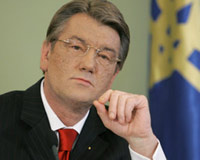
WILL THE ORANGE TEAM RE-UNITE?
WILL THE ORANGE TEAM RE-UNITE?
As Ukraine’s parliament reconvened after the winter recess, the caucuses of the pro-presidential Our Ukraine (NU) bloc and the Yulia Tymoshenko Bloc announced they would act as a unified opposition. NU and Tymoshenko have at least two common goals – early parliamentary elections and reversing last year’s constitutional reform. It is difficult to predict, however, whether this unity will last for long, as many influential members of NU do not trust Tymoshenko.
“I have united the opposition,” Tymoshenko announced on television on February 5. She said that the relevant agreement had been signed with the NU. Details of the accord emerged on February 6, the first day of parliament’s work after winter vacations. The document, signed by Tymoshenko and NU parliamentary faction leader Vyacheslav Kyrylenko, proclaims, “Our joint opposition efforts will help to eradicate the criminal-oligarchic government as soon as possible and revive Ukraine’s democratic and European development.”
In order to achieve this, the opposition has proposed to jointly draft a new constitution, disband parliament, and call new parliamentary elections. A new constitution, the newly re-unified opposition believes, should put an end to the redistribution of powers in the state in favor of parliament and the Cabinet, which was started by the constitutional reform of 2004-2006. President Viktor Yushchenko is institutionally weaker than his predecessor, Leonid Kuchma, having comparatively few levers of influence on the Cabinet of Ministers. “The role of parliament and the government is very strong at the moment,” Tymoshenko told television reporters on February 4. “Dictatorship from the presidential office has effectively been transferred to the Cabinet office.”
Tymoshenko makes no secret of her presidential ambitions. She wants to approach the presidential campaign of 2009 with a different constitution, one that would make the president stronger again. Yushchenko is as unhappy with constitutional reform as Tymoshenko, so it is logical that the two should unite their efforts in order to reverse constitutional reform.
Yushchenko has welcomed the news. Speaking in Munich on February 9, he said that the two blocs’ reunification had been prompted by the growing strength of the executive, which is dominated by the Party of Regions (PRU). “This is a position that I respect,” he said. The People’s Movement of Ukraine (Rukh), which is one of the biggest components of Our Ukraine, is also positive about the unification of efforts with Tymoshenko, Rukh leader and former foreign minister Borys Tarasyuk announced on February 6.
Not everybody in Our Ukraine is as positive about the agreement with Tymoshenko as Yushchenko or Tarasyuk. Many NU members still hold Tymoshenko responsible for the break-up of the first Orange government in September 2005. Her recent deal with the PRU, when the Tymoshenko bloc helped the PRU override Yushchenko’s veto on the controversial law on the Cabinet, has not made her more popular among NU members, either (see EDM, January 17).
Those wary of a union of Tymoshenko reportedly include such influential NU parliamentarians as the leader of the Union of Industrialists and Entrepreneurs Anatoly Kinakh; the former deputy head of Yushchenko’s office Anatoly Matvienko; former justice minister Serhy Holovaty; and Yuriy Yekhanurov, who replaced Tymoshenko as prime minister in 2005.
One of the opponents of the reunification with Tymoshenko, people’s deputy Pavlo Zhebrivsky, said on February 6 that the NU caucus did not authorize Kyrylenko to sign the accord with Tymoshenko. Yekhanurov said on the following day, perhaps tongue-in-cheek, that Tymoshenko’s party should rather unite with the United Social Democrats, who were close to former president Kuchma. Their ideologies are similar, according to Yekhanurov.
NU and Tymoshenko have apparently not been discouraged by the skepticism expressed by several senior Our Ukraine members. On February 9, Tymoshenko and NU signed an accord calling on NU and Tymoshenko bloc members at the local councils to closely cooperate. For NU, the document was signed by Viktor Baloha, who formally chairs Yushchenko’s People’s Union-Our Ukraine party and is the head of the presidential secretariat.
If the accords are not stillborn, a combined opposition consisting of Our Ukraine and Tymoshenko’s people will control 204 seats in the Ukrainian parliament, 22 short of a majority. This number is enough to, for example, put on the agenda a no-confidence motion against the parliamentary speaker. From February 5, NU started collecting signatures to dismiss Speaker Oleksandr Moroz. NU believes that Moroz signed the new law on the Cabinet of Ministers illegally (see EDM, February 9). It is the president who signs laws, thereby putting them into force, according to the constitution; the speaker may do so only in exceptional circumstances.
Tymoshenko on several earlier occasions spoke in favor of replacing Moroz in the post of speaker. A clearly articulated commons position on Moroz may become a litmus test for the unity of NU and the Tymoshenko bloc.
Inter TV, February 4; 1+1 TV, February 5; UNIAN, February 6; Interfax-Ukraine, February 6-9)


